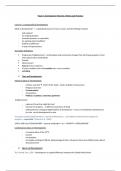Paper 3: Development Theories, Policies and Practices
Lecture 1: Conceptualising development
What is development? -> a specialised process in how it occurs and the thinking involved
- Self-evident?
- An ongoing practice
- Constant presence in materiality
- An aspiring state/condition?
- Evident by difference
- A state of improvement
Normative definitions:
Progressive; Enlightenment – technological and economical changes that will change people’s moral
and cultural values (embodied)
Growth
Advancement
Natural, linear trajectory
A latent condition that will transition into a new condition
unfolding
1. Time and Development
Historical ideas of ‘development’
- Cyclical, seasonal ‘Chart of the Yugas’, Cycles of global consciousness
- Religious doctrines
- Contextualised
- Assumptions
- Political, racialised, contested, gendered
Enlightenment
- rupture of how time might be lived
- Concept of ‘progress’ – a different awareness of being
- Anthropometry; biological legitimisation of development – focus on evolutionary development
for who can do development to who
“European colonial administrations… percieved themselves… not exploiters but benevolent agents of
progress… responsible” (Schech et al., 2000)
1950’s shift from ‘DEVELOPMENT = poverty eradication’ -to-> ‘POVERTY = DEVELOPMENT’
Contemporary ideas of ‘development’
- A metanarrative of the 20thC.
- Control
- Contestation
- A complex ontological (What), Epistemological (How, Measure), Discursive (Political and cultural
discussion) term
2. Space and Development
The ‘Brandt’ line, 1980 – Development as spatial difference between the Global North/South
, 3. Evolving indicators of ‘modern development’: Economic, social, environmental, political, and radical
alternatives
The ‘Millennium Development Goals’ (Hulme, 2009); a global agreement advocating collaborative action
and interventions that aims to reduce poverty and human deprivation at an unprecedented rate
“…bold but achievable…[t]hey represent a crucial midstation on the path to ending extreme poverty
by the year 2025’ (Sachs, 2005)
An intersection with the global environment across a global community
Development is spatially omnipresent
The ‘Sustainable Development Goals’
Changing ideas of where development should occur (ubiquitous)
d/Development (Cowen and Shenton, 1995) – Immanent (historical processes of change) and/or intentional
(deliberate actions taken by various private and public agencies)
(Hart, 2001);
big D' Development (the formal interventionist, international development sector)
- formal, professional practices, policies, and institutions of the Development industry with
colonial/WW2 origins
little 'd' development (the immanent structures and processes of capitalism)
- Geographically uneven, and profoundly contradictory set of historical processes
mainstream Development ideologies/ architecture emerging in the post-1945 era in context of
decolonisation and the Cold War - 1949 President Truman's 'modern' Development era -
Development’ conceptualised as constituting the ideologies, institutions and practices associated with
the distinct project of welfare, growth and 'progress' interventions in the 'underdeveloped' areas of
the Global South (Sachs, 1992)
**All that is solid melts in the air,
Mawdsley, E., and Taggart, J., 2021. Rethinking d/Development. Progress in Human Geography
An article investigating the notions of d/Development post-2008 inconjunction with Gillian Hart's
(2009) analysis, and how the terms have evolved.
Development as a discourse of entitlement and control agendas, but also open-ended;
- dynamic, variegated, and complex
- (dis)continuities, and is deeply inhabited by its actors (mainly those associated with capitalist
development),
Recent growing normalisation that states have a strong role in organising the economy and re-
distributions of capital - a deepening insertion of the private sector into Development; a shift from aid
to 'development finance'; the private sector as managers of global development policy; the ongoing
rising influence of the South; downgrading of bilateral Development agencies
What is considered in ‘Development’?
Economic growth of an economy over a period of time ? e.g. Ethiopia's growth (Easterly 2014)
- GDP/GNP/PPP




